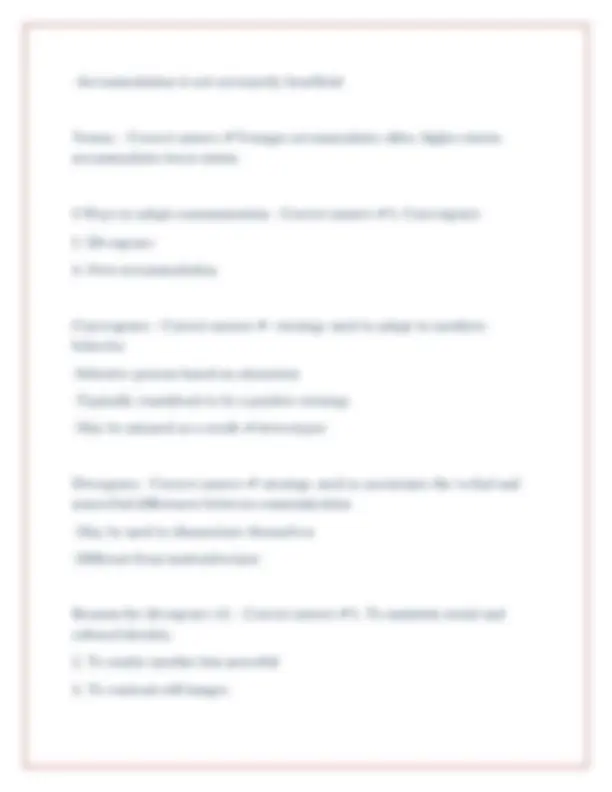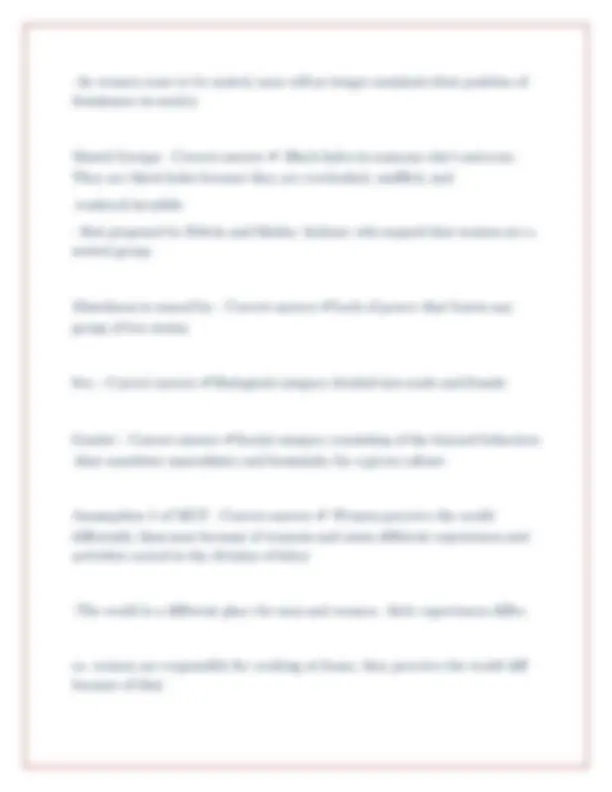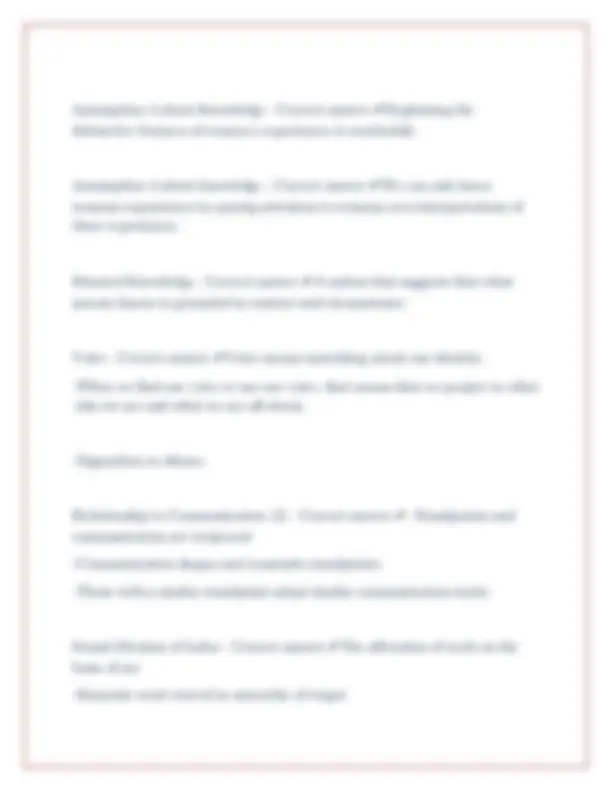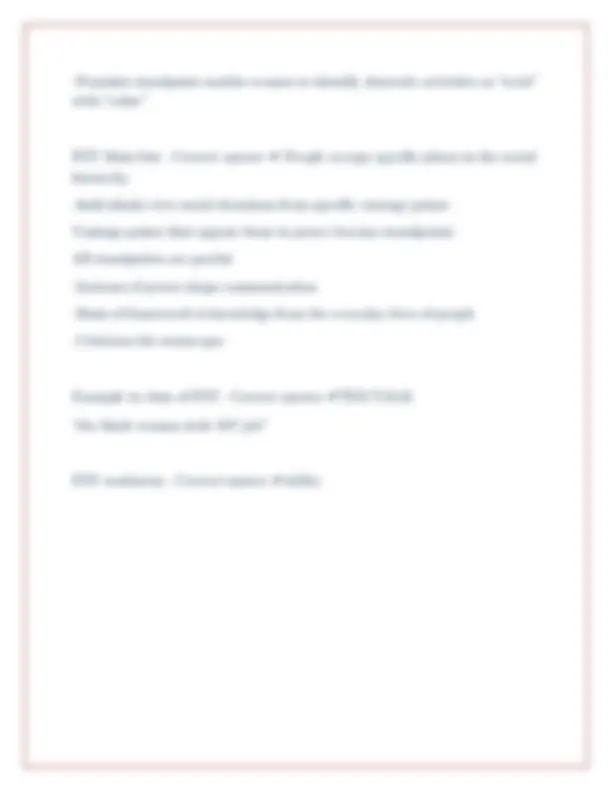













Study with the several resources on Docsity

Earn points by helping other students or get them with a premium plan


Prepare for your exams
Study with the several resources on Docsity

Earn points to download
Earn points by helping other students or get them with a premium plan
Community
Ask the community for help and clear up your study doubts
Discover the best universities in your country according to Docsity users
Free resources
Download our free guides on studying techniques, anxiety management strategies, and thesis advice from Docsity tutors
A focused overview of communication studies' key concepts and theories, particularly communication accommodation theory (CAT) and muted group theory (MGT). It defines these theories, outlines their characteristics and applications, and explores related concepts like convergence, divergence, and code-switching. Presented in a Q&A format, it aids exam preparation and review. It also covers historical context and key figures, offering a structured understanding of complex communication dynamics. Designed to help students grasp core principles and practical implications, enhancing analytical and critical thinking skills. It explores motivations and consequences of communication adjustments, including verbal and non-verbal aspects, and examines in-group influence on speech styles and factors determining language use in social contexts.
Typology: Exams
1 / 19

This page cannot be seen from the preview
Don't miss anything!












Communication | - | Correct | answer | ✔A | social | process | in | which | individuals | employ | symbols | to | establish | and | interpret | meaning | in | their | environment. |
Assumption | 1 | of | CAT | - | Correct | answer | ✔Speech | and | behavioral | similarities | and | dissimilarities | exist | in | all | conversations | -Interactants | have | different | experiences | and | backgrounds | -Experiences | and | backgrounds | influence | level | of | accommodation Assumption | 2 | of | CAT | - | Correct | answer | ✔The | way | we | perceive | the | speech | and | behaviors | of | others | will | determine | how | we | evaluate | a | conversation Perception | - | Correct | answer | ✔The | process | of | attending | to | and | interpreting | a | message Evaluation | - | Correct | answer | ✔The | process | of | judging | a | conversation Motivation | - | Correct | answer | ✔Desire | to | engage | with | an | interactant Assumption | 3 | of | CAT | - | Correct | answer | ✔Language | and | behaviors | impart | information | about | social | status | and | group | belonging | -Primary | language | reflects | the | person | with | the | higher | status | -New | group | members | are | willing | to | accommodate Assumption | 4 | of | CAT | - | Correct | answer | ✔Accommodation | varies | in | its | degree | of | appropriateness, | and | norms | guide | the | accommodation | process
-Accommodation | is | not | necessarily | beneficial Norms: | - | Correct | answer | ✔Younger | accommodates | older; | higher | status | accommodates | lower | status 3 | Ways | to | adapt | communication | - | Correct | answer | ✔1. | Convergence |
What | to | consider | when | code | switching | - | Correct | answer | ✔-It | can | be | perceived | as | rude | (Oprah | example) -Interpretation | of | the | new | language/style | may | be | different | than | native | speakers; | inaccuracy | and | miscommunication | can | occur/ CAT | tradition | - | Correct | answer | ✔Socio-psychological CAT | context | - | Correct | answer | ✔Cultural CAT | approach | - | Correct | answer | ✔Objective Strengths | of | CAT | - | Correct | answer | ✔Heuristic Weaknesses | of | CAT | - | Correct | answer | ✔- | Logical | Consistency | -Scope | (broad) Muted | Group | Theory | - | Correct | answer | ✔:) Example | in | textbook | - | Correct | answer | ✔ 40 | year | old | goes | back | to | college | and | is | having | a | hard | time | speaking | up. | She's | always | had | that | problem Muted | Group | Theory | is | an | ___________ | theory | - | Correct | answer | ✔Interpretive
-As | women | cease | to | be | muted, | men | will | no | longer | maintain | their | position | of | dominance | in | society Muted | Groups | - | Correct | answer | ✔-Black | holes | in | someone | else's | universe. | They | are | black | holes | because | they | are | overlooked, | muffled, | and | rendered | invisible
Assumption | 2 | of | MGT | - | Correct | answer | ✔Dominance | of | men's | systems | of | perception
Kramarae | believes | that | because | technology | is | interactive, | cyberspace | has | the | potential | to | be | a | humane | space | for | women Women's | truth | into | men's | talk: | - | Correct | answer | ✔Kramarae | believes | that | in | order | to | participate | in | society, | women | must | transform | their | own | models | in | terms | of | the | received | male | system | of | expression. |
scholarship—encoding | women's | experience | into | the | received | language | of | society. Unwanted | sexual | attention | until | recently, | went | unnamed | (although | it | is | very | real) The | battle | over | sexual | harassment | is | as | much | a | struggle | over | language | as | it | is | over | sexual | conduct... Sexual | harassment | according | to | Symbolic | Interaction | Theory | (Mead): | - | Correct | answer | ✔the | extent | of | knowing | is | the | extent | of | naming. Sexual | harassment | according | to | Sapir-Whorf | Hypothesis: | - | Correct | answer | ✔Language | shapes | our | perception | of | reality. | Women | do | not | have | public | recognizable | vocabulary | leads | to | self | doubt | legitimacy | and | validity | of | validity Kramarae's | central | contention: | - | Correct | answer | ✔Questions | of | power | are | central | to | all | human | relationships Strategies | for | change: | - | Correct | answer | ✔-Name | the | strategies | of | silencing -Reclaim, | elevate, | and | celebrate | "trivial" | discourse | (e.g., | oral | histories, | diaries, | journals) -Create | a | more | representative | language | to | capture | women's | uniquely | gendered | experiences
Historical | Foundations | (3) | - | Correct | answer | ✔1. | Marxist | Theory |
-Standpoints | are | partial | -"outsider | within" Assumption | 1 | about | Social | Life | - | Correct | answer | ✔class | position | structures | and | limits | understandings | of | social | relations Assumption | 2 | about | Social | Life | - | Correct | answer | ✔When | material | life | is | structured | in | opposing | ways | for | different | groups, | the | understanding | of | each | will | be | an | inversion | of | the | other Assumption | 3 | about | Social | Life | - | Correct | answer | ✔The | vision | of | the | ruling | group | structures | the | material | relations | in | which | all | groups | are | forced | to | participate Assumption | 4 | about | Social | Life | - | Correct | answer | ✔The | vision | available | to | an | oppressed | group | represents | struggle | and | an | achievement Assumption | 5 | about | Social | Life | - | Correct | answer | ✔The | understanding | of | the | oppressed | makes | visible | the | inhumanity | of | existing | relations | among | groups | and | creates | a | move | toward | a | better | and | more | just | world Assumption | 1 | about | Knowledge | - | Correct | answer | ✔No | knowledge | an | be | truly | objective Assumption | 2 | about | Knowledge | - | Correct | answer | ✔Women's | experiences | and | perspectives | differ | from | mens, | producing | different | communication | styles
-Feminist | standpoint | enables | women | to | identify | domestic | activities | as | "work" | with | "value" FST | Main | bits | - | Correct | answer | ✔-People | occupy | specific | places | in | the | social | hierarchy -Individuals | view | social | situations | from | specific | vantage | points Vantage | points | that | oppose | those | in | power | become | standpoints All | standpoints | are | partial -Systems | of | power | shape | communication -Basis | of | framework | is | knowledge | from | the | everyday | lives | of | people -Criticizes | the | status | quo Example | in | class | of | FST | - | Correct | answer | ✔TED | TALK "the | black | woman | stole | MY | job" FST | weaknesss | - | Correct | answer | ✔utility